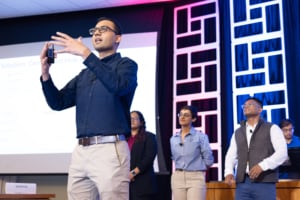How Rayni Turned Scientific Frustration into a First Place Finish at the 2025 New Venture Challenge
“We didn’t have all the answers yet,” Nag said. “But we knew there was something there, and we were ready to pursue it.”

Divyanshu Sharma, cofounder of Rayni
Through the Build Accelerator, Nag and Sharma refined their idea, did focused customer discovery, and were paired with mentors.
“Build wasn’t just helpful, it was essential,” said Nag. “That’s where we laid the groundwork for Rayni.”
Their success in the Build accelerator gave them momentum heading into the 2025 Edward L. Kaplan, ’71, New Venture Challenge (NVC), where Rayni would go on to win the Rattan L. Khosa First-Place Prize of $895,000, the largest share of a record-breaking $2.2 million in total awards.
Chicago Booth classes shaped their path as well – Entrepreneurial Selling taught them to pitch their idea and Accounting for Entrepreneurship helped them structure the business.
They also talked to past NVC participants, both those who won and those who didn’t, to learn what really mattered.
“We changed our strategy a lot along the way,” said Sharma. “And that was okay. The advice we got, along with our previous experience, helped us realize when to pivot and how to keep going.”
Rayni’s AI-powered platform helps scientists troubleshoot and operate complex lab equipment, like microscopes and mass spectrometers.
“Think of it like this,” said Nag. “If you’re baking a pizza, you care about the ingredients and how it tastes — not how the oven’s vacuum tubes work. But that’s exactly the position scientists are in. They’re forced to learn the machine, not just do the experiment.”
With Rayni, scientists get step-by-step guidance and instant support so they can focus on discovery instead of diagnostics.
Now, with the NVC behind them, the team is focused on closing their fundraising round, building out their engineering team, and preparing for further deployment in labs.
“In a year, we’re aiming to have a mature product, in multiple labs, generating more revenue and bringing smiles and joy to scientists as they experience less emotional frustration and get to focus on the part of the job that makes an impact on the world,” said Sharma.
Looking back, both founders credit their failures – not in spite of them, but because of them.
“Each time we tried and failed, we got a little further,” Nag said. “First, it was just an idea. Then we learned how to prototype and sell. Rayni is the third time — and it’s the charm.”











